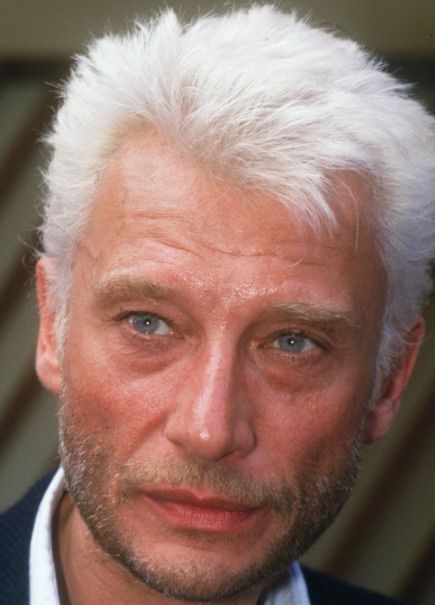L’Obs.fr sous-titre son premier article sur la mort de Johnny « le caméléon génial ». Cela m’a rappelé la publication d'un de mes premiers articles en juin 1970 dans l’excellent hebdomadaire britannique New Society (qui a disparu, bien sûr), que j’avais intitulé “ Yéyé and after ” et où j’avais repéré cet aspect de l’idole des jeunes. Un peu par miracle, je l’ai retrouvé.
For a foreigner, at least, pop music in England is omnipresent, “ in the air ”. It is indefinable, impalpable but inescapable. Pop has had notable influence on the cinema, on theatre, on advertising, on fashion… But in France, both the amount of pop and its effects are much smaller.
Pop started in France ten years ago when Johnny Halliday appeared on the stage of Le Golf Drouot. A would-be Presley, Halliday more or less killed off the traditional chanson ; only five or six of the traditional singers survived. He shouted, rolled on the ground, and uttered trivialities. His fans were mainly working class adolescents. Like the English Teds, who had turned to rock and roll, their French equivalent – the blousons noirs – played yéyé music. A few months after Halliday’s eruption, Daniel Filipacchi, who was a shrewd journalist and a daring businessman, launched a daily radio programme and a monthly magazine, both called Salut les Copains, after the title of a song by Gilbert Bécaud. Broadcast each daya t 5 pm on the Europe N° 1 station, Salut les Copains very soon diverted kids from ther studies (in France they get more homework than Englsih schoolchildren do). Europe 1 became a pop trampoline.
The other radio stations followed suit. And the impact of the magazine was probably even geater than that of the radio programme.. The magazine was among the first of its type. Its pages were full of glamorous photographs and very short, shallow articles. The world it created was a world of kids, exclusively for kids. Certainly the magazine was a new press phenomenon for France. There had not existed, before, a pressmade by young people for young people.
Then came Beatlemania. This was nearly as shattering in France as it was in England. The Beatles’ Paris performance in 1964 still lingers, even now, in the memories of all French pop fans. Dozens of theur songs were (badly) translated into French. And the Rolling Stone, the Who, the Animals, the Yardbirds and the Moody Blues also came for a share of the attention.
This invasion by English pop music was a salvation in a way, because it gave young French people something new and exciting, but it also ha dits inhibiting aspect. For singers and record producers, adapting an English song was easy enough. They simply chose the most successful English songs, translated them into French – et voilà – a new hit was born. Yéyé was stultified. It did not develop, and it confined itself to being a pale copy of Anglo-Saxon music. Thus Françoise Hardy was Marianne Faithfull, Claude François was Cliff Richard, and Johnny Halliday, well… he simply fashioned himself into an Englinsh singer, topping the charts in his own right in London.
A new era opened in 1965 when Adamo started to sing. Of Italian and Belgian origins, Adamo became the darling of 20 million young people. Good-looking, always smiling, his scratchy voice and his pseudo-poetic repertoire appealed to those who were fed up wuyh rhythm, blues, beat and noise. He has now made a solid international career.
Since 1968, however, French pop has grown much more sophisticated. English and American pop has finally had a positive influence ; and there have also been the Events of May. The singers are now more dedicated to their task. The bes example is Michel Polnareff, who is a premier prix of the Paris Conservatoire and wrote the music for Jean-Louis Barralt’s recent stage production of Rabelais. French groups like Martin Circus, Zoo, Triangle and Red Noise (the latter headed by the son of the novelist and jazz trumpeter, Boris Vian) follow the trail blazed by – among others – the Pink Floyd, who are more popular in France than in England, and the Mothers of Invention. At the moment, these groups are still rather obscure and regrettably esoteric. They are like Boris Vian himself, cloistered with his trumpet in St Germain-des-Prés during the 1950s.
The pop press, too, has become more way-out, more politically minded and less given to any kind of concession., with magazines such as Rock et Flok and Best. The old-time clientele of Salut les Copains has been to the barricades and is now more intransigent.
It is sometimes maintained that pop in England and America has actually crated a “ counter culture ”. Is the true of France? One difficulty is that the word “ culture ” does not mean the same thing on both sides of the Channel. In England “ culture ” can mean simply a way of life. In France, it is a vaguer and larger notion, closed to the German concept of Kultur, or, as Édouard Herriot put it, “Ce qui reste quand on a tout oublié”. To simplify greatly: to crate a counter-culture in England is to put forward a new way of life. But in the French Cartesian society, one has to offer a whole new way of thinking, and French pop has not done this.
Even protest in Britain adopts, usually quite different tactics from in France. In Britain, it outmanoeuvres the system: it goes under or beside ; and it lives, by and large, in a peaceful coexistence with the system. For example, the Beatles may never have swayed an election, but they helped give many English kids the idea that traditional politics was uninteresting. In France, protest goes against the system.
In France, pop groups meet with little success. The stars of the Top Ten are individuals. The sociological may be England’s traditional liking for associations of people, for clubs. The musical reason goes back to the heyday of the chanson, when songs were recorded by people who wrote for themselves (Trénet, Brassens) or by individual singers who drew the support of talented songwriters (Piaf, Gréco, Montand). In any event, French addicts of “ mlusic hall ” have always been used to seing the singer lost on an immense stage, illuminated by a spot of crude light.
The future of pop in France appears gloomy. On cause for gloom is the singers themselves. In Britain and America, pop stars are more or less what they create. In France, they set themselves apart from their creations. English and American pop stars are music-makers. French pop stars are actors. And when French pop singers try to be genuine, they are stifled by the operators, who pull their strings.
Another cause for gloom is the censorship. France is not Greece. So government censorship is more constricting and annoying than harassing or dictatorial. To take a recent example, the authorities at first refused to let the Le Bourget pop music festival take place in the airport – on the ground that it would be noisy. After tough discussion, they then accepted, but on condition that the word “ pop ” should be deleted from the publicity posters.
I was recently told about a misadventure that happened to Adamo. A year ago, he gave some performance in the United States and recorded a rock LP. Back in France, he then showed the master pressing to his impresario, who said: « We have no public for that kind of music. » Yet listeners’ request programmes in France play Chicago or Led Zeppelin more often than Claude François.
As long as showbiz in France sells music in the same way that it wood sell noodles some censorship will be self imposed.
PS : le tropisme caméléonesque chez Johnny tient peut-être – mais je n'en sais trop rien – à ses origines familiales. Lors de sa toute première interview radiophonique, il affirme être de père “ américain ”. Son père, Léon Smet, était un comédien et acteur belge de talent proche des surréalistes de son pays. Pendant la Deuxième Guerre mondiale, son attitude fut passablement ambiguë. En 1943, il obtient le poste de responsable des programmes de la chaîne de télévision allemande destinée aux troupes dans les hôpitaux, dont les studios étaient situés à Paris, rue Cognac-Jay. En 2011, Johnny confie à Libération: « Mes parents ne m’envoyaient pas à l’école par peur des représailles, parce que mon père avait été collabo, et que ça se savait un peu dans le quartier en bas de la rue Blanche. Quand j’ai eu l’âge de comprendre, ça m’a choqué. Mes copains étant juifs, j’étais très mal à l’aise. C’est pour ça qu’à l’époque je me suis inventé un père américain. Pour fuir tout ça. »
Léon Smet était absent le jour de la naissance du son fils, Jean-Philippe. Johnny Halliday commença par porter le nom de sa mère, le temps que l'on retrouve Léon Smet et qu'il déclare sa paternité. C'est alors que Jean-Philippe fut appelé Smet.


Aucun commentaire:
Enregistrer un commentaire